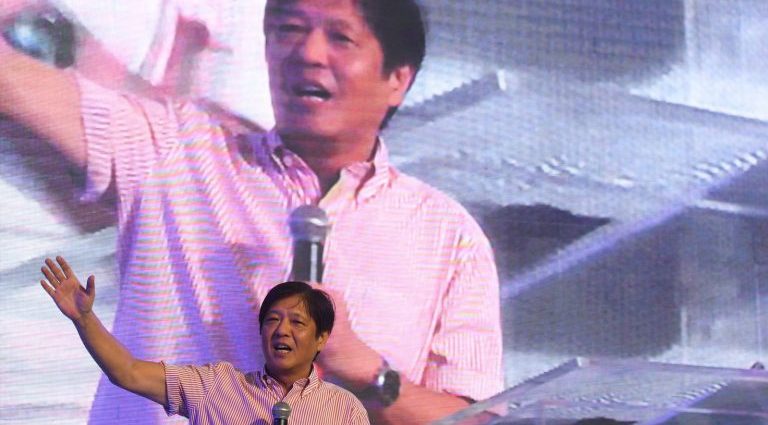
The Marcos family is back in power after 36 years. Its return is a dangerous moment for democracy in the Philippines.
Ferdinand “Bongbong” Marcos Jr was elected in a landslide victory in May, gathering more than 30.8 million votes and winning almost 60% of the vote. This was the Philippines’ first majority victory in decades.
Marcos Jr’s father, Ferdinand Marcos Sr, was elected president in 1965 but later consolidated dictatorial power after declaring martial law in 1972. His regime oversaw severe human-rights abuses, including arrests, forced disappearances, torture and extrajudicial killings.
The Human Rights Violations Victims Memorial Commission estimates that 11,103 people were victims of rights violations under the Marcos Sr regime. However, this number only covers those who made claims for compensation. Amnesty International has instead claimed that well over 100,000 people were killed, tortured or imprisoned under the regime.
The Marcos family was also notorious for corruption. The family allegedly stole US$10 billion while in power, with approximately $4 billion recovered, and left $3 billion in taxes unpaid.
Imelda Marcos, the wife of Marcos Sr, was known for her expensive tastes and jet-setting lifestyle. This came to epitomize the family’s extravagance while most Filipinos lived in poverty.
Marcos Sr was eventually ousted in 1986 by a popular uprising, known as the People Power Revolution. This was in response to the murder of opposition leader Benigno Aquino in 1983. The family, including Marcos Jr, fled the Philippines into exile in Hawaii.
The brutality and malgovernance of the Marcos family marked a dark period for many in the Philippines.
Rewriting history
The concern with Marcos Jr is that his election victory came off the back of a revisionist election campaign aimed at rehabilitating his father’s regime, labeling it a “golden age.”
During the campaign, Marcos Jr refused to join election debates, thereby not exposing himself to awkward questions about his family history, legal problems and the issue of dynasties in Philippine politics.
In addition, he used social-media platforms like YouTube and TikTok to revise history, including online campaigns that spread misinformation to target groups, particularly young Filipinos. This strategy was aimed at rejuvenating the family’s reputation by claiming there was significant economic progress under Marcos Sr, while also playing down documented human-rights abuses.
More recently, Marcos Jr has publicly stated that labeling his father a dictator was “not accurate” and that martial law was necessary to battle communist groups. What was not mentioned was that Marcos Sr’s term in office would have ended in 1973 if martial law had not been declared.
Marcos Jr also expressed his intent to reopen the court case that ordered his family to pay an outstanding $403 million in estate tax, arguing that they were unable to argue their case because they were in exile in Hawaii. This too is incorrect, with the court case occurring in the 1990s, when the family was back in the Philippines.
The worry for many Filipinos is that the return of the Marcoses will further damage its already brittle democracy, particularly after six years under populist president Rodrigo Duterte.
Marcos Jr has already overseen several decisions that justify this concern.
The arrest of former vice-presidential candidate Walden Bello on charges of cyber libel has raised concerns about freedom of speech under the new government. In July, the Philippine Court of Appeals affirmed the conviction of Maria Ressa, two years after she was arrested for the same crime. This confirms the fears of journalists who have been warning that Marcos Jr would take a hardline stance on press freedom.
In a further blow to human rights, Marcos Jr has ruled out rejoining the International Criminal Court. The Philippines withdrew from the ICC in 2019 and has recently announced it is restarting its investigation into the “war on drugs.” Marcos Jr’s refusal to rejoin the court raises serious concerns about his respect for the rule of law and human rights.
Dynasty politics
While the Philippines is one of the region’s oldest and largest democracies, the return of history in the form of the Marcoses has put it on life support.
This is largely due to the stubborn popularity of dynasty politics and strongmen in the Philippines, and the use of misinformation to achieve electoral success.
For this reason, the merits of democracy, freedom of speech and the rule of law have been usurped by the myth of a strong and successful Marcos dynasty that is not based on reality.
While the alure of strongmen in the Philippines is not new, after six years of Rodrigo Duterte’s brutal “war on drugs,” the country desperately needs a clean break from its troubled history.
This will only happen when opposition parties use effective grassroots campaigns to connect with voters and convince them of the merit of democratic values, human rights and truth.
Marcos Jr also needs to walk the talk after his vow to respect human rights. This can be achieved by meaningful reforms that ensure freedom of the press and justice for the families of those killed during the “war on drugs.”
While it is admittedly difficult, journalists in the Philippines need to continue to hold Marcos Jr to account for any abuses of power. This should be strongly supported by the international community.
The return of the Marcos family shows that Philippine democracy is in peril. It is vital that the country’s institutions and the human rights of Filipinos are respected by the new regime. If not, then democracy might not return.

